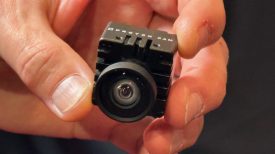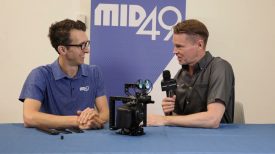By Matt Allard
I recently read a very good article by Mike Jones where he talks about the digital age of film making and how every man and his dog are now calling themselves a professional film maker. Mike is a lecturer in screen studies at the Australian Film TV and Radio School where he teaches across departments and disciplines – from SciFi and Horror genres, to WebTV development; from screen history and culture to screenwriting and technical production.

I’ll quote some of what he said, “Would all you multi-hyphenate, DSLR shooting, one-man-band, editor / director / screenwriter / colour-grader / filmmakers, with your ultra-shallow depth-of-field, Vimeo hosted music-video showreels – who have never actually had a paid professional gig in your life – please, for the love of God, SHUT THE F**K UP…!
Please stop blogging, please stop tweeting, please stop dispensing advice or setting up websites with your ‘pro’ techniques and commentary, please stop propagating fallacy and ignorance, please stop offering your opinions on what is or isn’t Cinematic, please stop signing your signature with a litany of job titles just because you own a fist-full of software plug-ins and a Mac. Please stop pretending…”
He then goes on to say “Ok, Allow me to qualify my consternation. There has been a distinct trend shift over the past decade in the way we discuss and use the term ‘professional’ particularly in relation to the screen media production. Once upon a time the term Professional had a very specific meaning – a doctor, priest or lawyer – specialized positions of trust. Later the term broadened and embodied a person who makes a living from a knowledge-based art or craft and is hence denoted as belonging to a ‘profession’. The word ‘profession’ derives from someone who ‘professes’ for gain or livelihood in an activity or field of endeavor often engaged in by amateurs.
However the moniker of Professional seems now to be adopted not just by those who possess specialist knowledge and make a living from that knowledge, but also by those who simply claim to have a professional attitude, a professional mindset, a professional demeanor irrespective of whether they actually make a professional living from that knowledge or even whether they possess that knowledge or experience at all. In short, the notion of a screen media ‘professional’ has been watered down into a evaporating puddle of mediocrity and irrelevance.”
I see where he is coming from. With the falling prices of cameras and the rapid advances in technology, more and more people are getting into film making. Is this a bad thing? Well no. In my opinion it’s great to see so many people picking up cameras and shooting. The flip side of this though is what Mike talks about in his article. Professional refers to someone who makes a living out of what they do. Anyone these days can go buy a camera, create a Vimeo page and start up a website – but it doesn’t make them a Professional. Unfortunately today there are so many web sites and forums full of guys with an opinion. Guys who aren’t professionals trying to critique others work, telling you what looks cinematic and pretending to be the world’s biggest experts on anything to do with filming. Now this isn’t everyone, but there is a large number who fit this category.
Buying a 5DmkII doesn’t make you an expert and nor should you pretend to act like one. People who make videos on a weekend, then go onto a blog and pretend to know everything can be equated to someone buying a guitar and then going and telling Joe Satriani or Eddie Van Halen that they’re doing it all wrong. If you are not a professional then show some humility and be prepared to learn. Thinking you know it all will not get you into this industry – in the long term it will hurt your own work. This doesn’t mean all professionals know what they are talking about or are good at what they do either. There are lots of w**kers in this industry who simply got jobs because their uncle worked at a TV station or a production house. Getting your foot in the door is very,very difficult. There are not that many good positions out there and a lot of freelance guys really struggle.

I’ve been doing this professionally for more than 20 years now. I had to start at the bottom and work my way up. I never pretended to know everything and tried to learn from as many different cameramen as possible. Even to this day I’m still learning. Every shoot I do I learn something new. I’ve shot more than 25,000 Interviews, worked on more than 10,000 stories and done hundreds of international assignments – and I still don’t consider myself an expert.
People who are getting into filmmaking should try to develop their own style. Watch what others do but don’t try and become who they are. Learn from lots of different cameramen and ask as many different questions as you can. Don’t believe everything you read on websites and don’t just read one or two of them (Ed – even this one!). Look around as there are so many differing opinions and ways of doing something. Please don’t think you need all the equipment and a super fancy 4K camera to do something good. I still laugh at all the forum posts where people are complaining that this camera or that camera doesn’t do 4K or 300fps. Who has a 4k monitor at home? How many people are shooting for the big screen? Most of the stuff you see is on the web, where quite frankly you can’t tell the difference between a $50k camera and a $1k one. It’s WHAT YOU SHOOT, not what you shoot it with.
The point of all this is that I believe nobody is an expert. There are lots of professionals out there but also a lot of people who have no idea about what they are talking about. Most of us do this job because we love it, not because of the money. It’s thought in some circles that it takes between 10,000 to 20,000 hours to become an expert at something. Well in some ways this is true but I still believe you are never an expert. We always have the capacity to learn something new every day.
I’ll leave these final words from Mike whose article sums it up nicely: “In short, my message to those who may be guilty of these crimes (yes, you know who you are) is this – Start acting like an Aspiring Amateur rather than a Pretending Professional and I think you’ll find you get to your goal of making a living as a professional a lot quicker. Start acting like someone who wants to learn and knows they have much to learn openly and honestly, rather than slipping into the pit of self-delusion that will result in nothing but the perpetuation of ignorance. Be careful who you read, choose your sources carefully, check the ‘about’ page of the website to see if the author has credability. Cross-check opinions on technology and technique with writers who do know what they are talking about. I am a vivacious website and blog reader about production technology but I can assure that 16 out of every 20 websites and blogs I encounter propogate nothing but fallacies, innacuracies and misunderstandings. To be an effective Learner you need to have good powers of critical-thinking to sift through the bullshit. Because there is a whole lot of Bullshit out there.
True Professionals are more likely to take you seriously and be inclined to help you if you dont try and pretend to be something you’re not. The honesty and openness of being apsiring is much more productive than the close-minded arrogance of the fraud-professional.
So stop pretending – if you are an aspiring amateur then proudly say so – you’ll learn more and have people far more willing to help you and offer you opportunities. But if you persist with being a fraud, with pretending your merit exceeds your experience, if you insist on calling yourself a professional when you are clearly are not making a living in the profession, then the only people who will buy into your trust value will be other frauds and non-professionals. If you would like one day to make a living making screen media, then start acting like an Amateur. You’ll get there faster.”
Mike currently has a number of projects in development including a new book on episodic storytelling, a novel, a screenplay adaptation and a number of transmedia productions.
About Matthew Allard, Aljazeera Senior Field Cameraman, Kuala Lumpur:
Matt has been a Camera/Editor in TV news for more 20 years, previously working for both Channel 9 and Channel 10 in Australia. Twice Network Ten Australia’s cameraman of the year as well as being a Walkley Finalist for outstanding camerawork in 2006 (for coverage of the Cronulla Race Riots) and a Logie Finalist for outstanding news coverage 2006 (Bali 9). He is a multiple ACS (Australian Cinematographers Society) award winner. His Sword Maker story that was shot on a 7D won the prestigious Neil Davis International News Golden Tripod at the 2011 ACS Awards. He has covered news events in more than 35 countries, from major sporting events to terrorist bombings. Based out of the Kuala Lumpur broadcast centre in Malaysia he is an avid user and follower of new technology, shooting stories on HD broadcast cameras, the Sony F3 as well as new Canon DSLRs.






